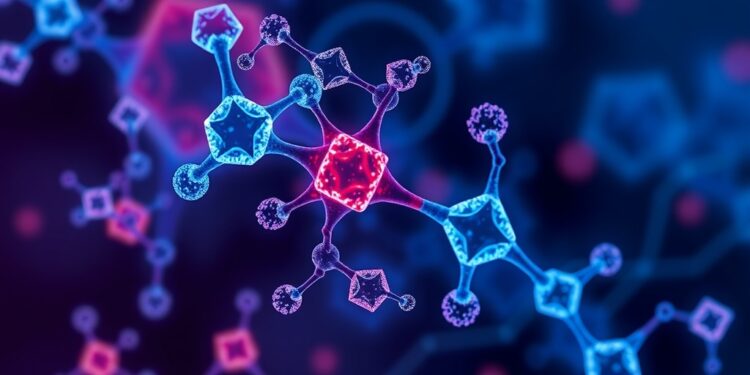
Insilico Medicine, a pioneering force in the realm of artificial intelligence-driven biotechnology, has made significant strides in the battle against refractory and treatment-resistant cancers. The company recently unveiled a groundbreaking study showcasing a novel series of orally available covalent inhibitors that specifically target cyclin-dependent kinases 12 and 13 (CDK12/13). This important research, published in the esteemed Journal of Medicinal Chemistry, highlights the identification of compound 12b, which promises new hope for patients facing some of the most challenging cancers to treat.
The cyclin-dependent kinases 12 and 13 are integral to the regulation of the DNA damage response (DDR) pathway, a crucial mechanism that maintains genomic stability. Their role in tumorigenesis and the emergence of resistance to various antitumor therapies underscores the need for effective inhibitors that can selectively and potently target these proteins. Historically, the development of such inhibitors has encountered significant obstacles, primarily due to issues related to toxicity and ineffectiveness linked to previous non-covalent and covalent inhibitors.
To overcome these barriers, the researchers at Insilico Medicine leveraged their state-of-the-art generative AI platforms, particularly PandaOmics and Chemistry42. These powerful tools enabled a comprehensive analysis of potential therapeutic targets, allowing CDK12 to emerge as a top candidate from extensive multiomic datasets. The AI’s ability to process vast amounts of biological data not only facilitated the identification of promising targets but also aided in the prioritization of indications for cancer types most likely to benefit from this therapeutic approach.
Following the identification of CDK12, the research team utilized AI-guided structure-activity relationship (SAR) methodologies. This approach allowed them to design new compounds with optimized properties, focusing on enhancing the selectivity and stability of the inhibitors while minimizing off-target effects. The resultant compound series demonstrated improved oral bioavailability and pronounced inhibitory activity against CDK12 and CDK13.
During the preclinical evaluation phase, extensive in vitro and in vivo examinations of compound 12b revealed remarkable potency, achieving nanomolar concentrations across various cancer cell lines. The compound not only exhibited favorable pharmacokinetic properties but also displayed substantial efficacy in targeted cancer models, including breast cancer and acute myeloid leukemia (AML). Importantly, these positive effects were observed without inducing intolerable side effects, addressing a significant hurdle in the development of novel cancer therapeutics.
The implications of this research extend beyond mere findings, as Dr. Hongfu Lu, the co-lead author of the study and Senior Director of Chemistry at Insilico Medicine, articulated the company’s vision of revolutionizing the drug discovery process using advanced AI technologies. Dr. Lu emphasized the potential of CDK12/13 dual inhibitors to effectively target treatment-resistant tumors, marking a crucial step toward enhancing cancer treatment outcomes and patient care.
The use of AI in drug discovery represents a paradigm shift in the way therapeutic agents are developed. By harnessing the power of deep learning and generative models, Insilico Medicine is not only accelerating the discovery of new compounds but is also optimizing existing ones to make significant improvements in efficacy and safety. This intersection of technology and drug development is paving the way for breakthroughs that could redefine treatment options available to oncologists and their patients.
The study’s findings are particularly germane in light of the growing recognition of cancer’s complexity and the necessity for tailored therapeutic strategies. The insights gained from the extensive computational analyses and biological evaluations provide a compelling framework for future studies aimed at expanding the applicability of CDK12/13 inhibitors. As research continues, there is optimism that these findings will transition to clinical trials, potentially revolutionizing therapeutic approaches for patients with difficult-to-treat cancers.
The urgency for novel cancer therapies has never been more pressing, particularly as the rise of treatment-resistant tumors poses an ever-growing challenge. Insilico Medicine’s work not only illuminates the path forward for targeted therapies but also reinforces the potential of AI to catalyze advancements in oncology. The collaborative efforts amongst biologists, chemists, and data scientists are crucial as they work towards delivering innovative treatments that leverage cutting-edge technology.
As this field of research advances, it is essential to maintain a dialogue about the implications of AI in drug discovery, particularly regarding ethical considerations, data security, and the need for robust regulatory frameworks. The promise of generative AI-driven drug development offers unprecedented opportunities, yet it comes with responsibilities that must be navigated carefully to ensure that therapeutic breakthroughs benefit all segments of the population.
In conclusion, Insilico Medicine’s publication shines a light on a promising avenue in cancer therapeutics, highlighting the role of AI in overcoming longstanding challenges in drug discovery. The introduction of orally available covalent CDK12/13 dual inhibitors signifies a remarkable achievement toward developing therapies that could reshape the landscape of cancer treatment. As the field evolves, continued research, collaboration, and innovation will be essential to bring these promising compounds from the lab to the clinic, ultimately changing the lives of patients battling cancer.
Subject of Research: CDK12/13 dual inhibitors as a treatment for refractory cancers
Article Title: Design, synthesis, and biological evaluation of novel orally available covalent CDK12/13 dual inhibitors for the treatment of tumors
News Publication Date: 13-Feb-2025
Web References: www.insilico.com
References: Lu, H., et al. (2025). Journal of Medicinal Chemistry. DOI: 10.1021/acs.jmedchem.4c01616
Image Credits: Not provided
Keywords
Generative AI, Molecular targets, Breast cancer, Discovery research, Colorectal cancer, Ovarian cancer, Computational chemistry
Tags: biotechnology advancements in oncologyCDK12/13 dual inhibitorscyclin-dependent kinases inhibitorsDNA damage response pathwaygenerative AI in drug discoverygenomic stability in tumorsInsilico MedicineJournal of Medicinal Chemistry researchnovel cancer therapiesorally available covalent inhibitorsovercoming drug development challengestreatment-resistant cancers





